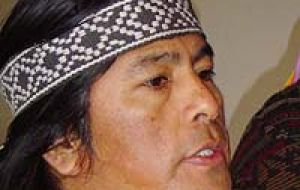MercoPress. South Atlantic News Agency
Latin America Indians conference in Bariloche
 “Our territory is constantly under threat” said Nahuel
“Our territory is constantly under threat” said Nahuel Representatives from indigenous communities from across Latin America will join international experts in Bariloche, in a bid to articulate their concerns over threats to their ancestral lands.
They are expected to meet during the Second Latin American National Parks Conference, held between September 30 and October 6 in Río Negro province. In all, around 1,500 people will debate issues such as the administration and maintenance of national parks over a week at the Panamericano hotel. The seminar includes the presence of at least 150 representatives from communities such as Kuna (Panama), Quechua (Ecuador), Uwa (Colombia), Maya Quiché (Guatemala), Garífunas (Honduras) and Terena (Brazil). "This conference is very important to us," said Mapuche member Jorge Nahuel, also a coordinator of the Native People's Forum. "We are willing to discuss and write a report in order to outline the political strategies that should be applied during the next ten years in the country where we live." "Our territory is constantly under threat by those seeking financial gains through exploiting natural resources such as water and oil," Nahuel said. The Mapuche Confederation of Neuquén province together with the Tinkunaku Kolla indigenous community have recently submitted a report to different governments, NGOs and international organizations evoking the rights they claim over land and denouncing abuses. "The Patagonian land is a heritage from our ancestors," the document states. "We have the right to fight for the survival of our culture and to be autonomous." Moreover, the report makes reference to the Declaration of Rights of Indigenous Peoples, which was approved on September 13 by the UN General Assembly despite objections from the US, Canada, Australia and New Zealand, who argued that it was incompatible with existing laws. The declaration affirms the equality of the more than 370 million indigenous peoples and their right to maintain their own institutions, cultures and spiritual traditions. It also establishes standards to combat discrimination and marginalization. Buenos Aires Herald




Top Comments
Disclaimer & comment rulesCommenting for this story is now closed.
If you have a Facebook account, become a fan and comment on our Facebook Page!